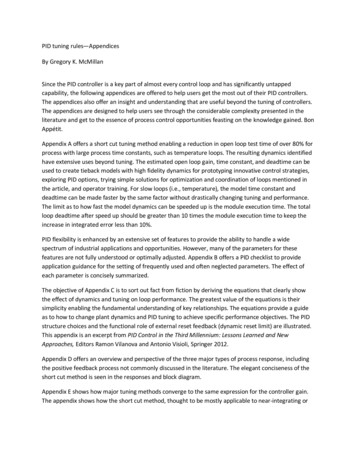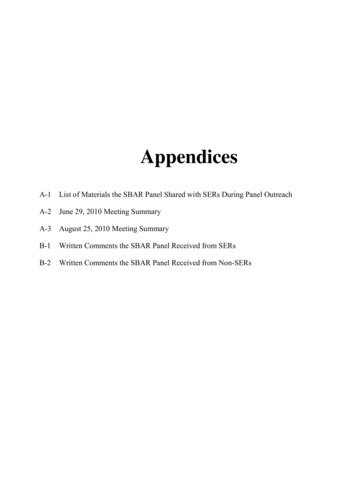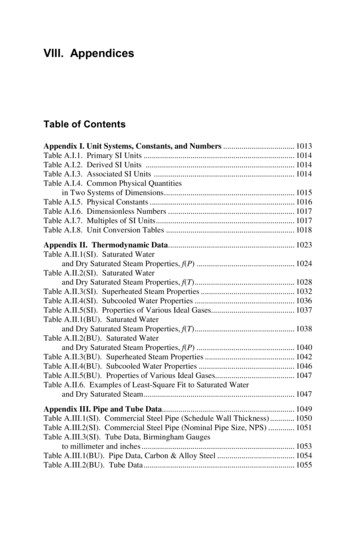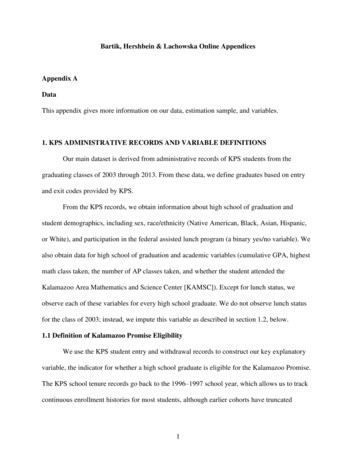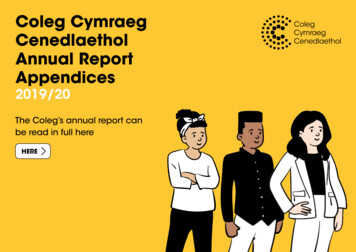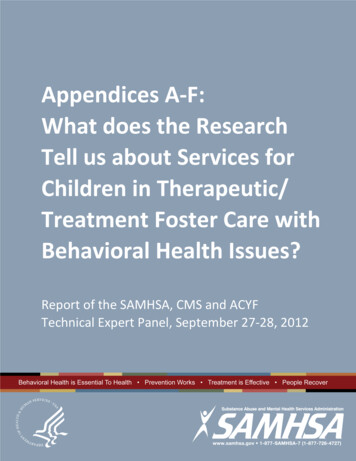
Transcription
Appendices A-F:What does the ResearchTell us about Services forChildren in Therapeutic/Treatment Foster Care withBehavioral Health Issues?Report of the SAMHSA, CMS and ACYFTechnical Expert Panel, September 27-28, 2012
AcknowledgmentsThis report was prepared for the Substance Abuse and Mental Health Services Administration(SAMHSA) by Truven Health Analytics and Georgetown University under contract numberHHSS283200700029I, with SAMHSA, U.S. Department of Health and Human Services (HHS).Kevin Malone served as the Government Project Officer.DisclaimerThe views, opinions, and content of this publication are those of the author and do not necessarilyreflect the views, opinions, or policies of SAMHSA or HHS.Public Domain NoticeAll material appearing in this report is in the public domain and may be reproduced or copiedwithout permission from SAMHSA. Citation for Article of the source is appreciated. However,this publication may not be reproduced or distributed for a fee without the specific, writtenauthorization of the Office of Communications, SAMHSA, HHS.Electronic Access and Printed CopiesThis publication may be downloaded or ordered at http://store.samhsa.gov. Or call SAMHSA at 1877-SAMHSA-7 (1-877-726-4727) (English and Español).Recommended Citation for ArticleSubstance Abuse and Mental Health Services Administration. (2013). Appendices A–F: Whatdoes the Research Tell us about Services for Children in Therapeutic/Treatment Foster Care withBehavioral Health Issues? Report of the SAMHSA, CMS and ACYF Technical Expert Panel,September 27–28, 2012. HHS Publication No. (SMA) 14-4842. Rockville, MD: Center forSubstance Abuse Treatment, Substance Abuse and Mental Health Services Administration.Originating OfficeOffice of Policy, Planning, and Innovation, Center for Substance Abuse Treatment, SubstanceAbuse and Mental Health Services Administration, 1 Choke Cherry Road, Rockville, MD 20857.HHS Publication No. (SMA) 14-4842. Printed 2014.
ContentsAppendix A: Technical Expert Panel Meeting Agenda . 3Appendix B: Technical Expert Panel Participant List . 9Appendix C: Consensus Process . 16Appendix D: Consensus Statement Tables . 18Technical Expert Panel Consensus Process Results Question 1, Round 1 . 19Technical Expert Panel Consensus Process Results Question 2, Round 1 . 49Technical Expert Panel Consensus Process Results Question 3, Round 1 . 72Technical Expert Panel Consensus Process Results Question 1, Round 2 . 99Technical Expert Panel Consensus Process Results Question 2, Round 2 . 106Technical Expert Panel Consensus Process Results Question 3, Round 2 . 111Appendix E: Assessing the Evidence Base . 120Review of Therapeutic/Treatment Foster Care Research . 122Framework for Data on Individual Articles . 134Appendix F: Contributors . 1982
Appendix A: Technical Expert Panel Meeting Agenda3
What Does the Research Tell Us About Services forChildren in Therapeutic/Treatment Foster CareWith Behavioral Health Issues?Technical Expert PanelCenters for Medicare & Medicaid ServicesBaltimore, MDSeptember 27-28, 2012AgendaSeptember 27, 2012I.What Do We Know About Therapeutic/Treatment Foster Care?9:00 a.m.WelcomeCarol Spigner, M.S.W., D.S.W.FacilitatorBarbara C. Edwards, M.P.P.Group DirectorCenters for Medicare & Medicaid ServicesCMS/CMCS/Disabled and Elderly Health Programs GroupLarke Huang, Ph.D.Senior Advisor on ChildrenLead, Trauma and Justice Strategic InitiativeAdministrator's Office of Policy Planning and InnovationSubstance Abuse and Mental Health Services AdministrationClare Anderson, M.S.W., L.I.C.S.W.Deputy CommissionerAdministration on Children, Youth and Families9:30 a.m.Consensus ProcessDoreen Cavanaugh, Ph.D.4
Research ProfessorHealth Policy InstituteGeorgetown UniversityII.What Do We Know About Identifying Youth Appropriate forTherapeutic/Treatment Foster Care?9:45 a.m.What Does the Research Tell Us About Children in Therapeutic/TreatmentFoster Care?Bryan Samuels, M.P.P.Commissioner, Administration on Children, Youth and FamiliesAdministration for Children and FamiliesU.S. Department of Health and Human Services10:30 a.m.Break10:45 a.m.What is the Current State of the Research Base for Therapeutic/TreatmentFoster Care for Youth?Johna Hughes Bruton, M.S.W.Clinical Assistant ProfessorSchool of Social WorkUniversity of North Carolina11:00 a.m.Discussion11:30 a.m.Screening, Assessment, and Level-of-Care Placement Criteria forTherapeutic/Treatment Foster CareAnn Doucette, Ph.D.Research Professor of Evaluation and Health PolicyDirector, Midge Smith Center for Evaluation EffectivenessDirector, The Evaluators’ InstituteThe George Washington University11:55 a.m.Discussion5
12:30 p.m.III.LunchWhat Do We Know About the Essential Elements of Therapeutic/Treatment FosterCare?1:45 p.m.What is the Evidence Base for Essential Elements of Therapeutic/ TreatmentFoster Care for Youth?John Landsverk, Ph.D.Director, Child & Adolescent Services Research CenterRady Children's Hospital2:05 p.m.Discussion2:45 p.m.BreakIV.What Do We Know About the Psychosocial Treatment of Youth inTherapeutic/Treatment Foster Care?3:00 p.m.What Does the Research Tell Us About Mental Health and Other Service Useby Youth in Therapeutic/Treatment Foster Care?J. Curtis McMillen, Ph.D.ProfessorSchool of Social Service AdministrationUniversity of Chicago3:20 p.m.Discussion4:00 p.m.Adjournment6
What Does the Research Tell Us About Services forChildren in Therapeutic/Treatment Foster CareWith Behavioral Health Issues?Technical Expert PanelCenters for Medicare & Medicaid ServicesBaltimore, MDSeptember 27-28, 2012AgendaSeptember 28, 20129:00 a.m.WelcomeCarol Spigner, M.S.W., D.S.W.Facilitator10:00 a.m.Discussion10:40 a.m.BreakI.What Do We Know about Outcomes for Youth in Therapeutic/Treatment FosterCare?9:15 a.m.What Does the Research Tell Us About Juvenile Justice andMental Health Outcomes for Youth in Therapeutic/Treatment Foster Care?Leslie D. Leve, Ph.D.7
Senior ScientistOregon Social Learning CenterSubstance Use Disorder and Child Welfare Outcomes for Youth inTherapeutic/Treatment Foster CareJohna Hughes Bruton, M.S.W.Clinical Assistant ProfessorSchool of Social WorkUniversity of North CarolinaLong-Term Mental Health Outcomes for Ethnically Diverse Adults Placed inFamily Foster Care as ChildrenSusy Villegas, Ph.D., L.C.S.W.Assistant ProfessorSchool of Social WorkUniversity of OklahomaII.What Do We Know about Organizational Issues in Therapeutic/Treatment FosterCare?10:55 a.m.What Does the Research Tell Us About Organizational Issues Related to theProvision of Therapeutic/Treatment Foster Care?Elizabeth M.Z. Farmer, Ph.D.ProfessorSchool of Social WorkVirginia Commonwealth University11:15 a.m.Discussion12:00 p.m.Adjourn8
Appendix B: Technical Expert Panel Participant List
What Does the Research Tell Us About Services for Children inTherapeutic/Treatment Foster Care With Behavioral Health Issues?Technical Expert PanelSeptember 27-28, 2012 Centers for Medicare & Medicaid Services Baltimore,MarylandPARTICIPANT LISTRichard Barth, Ph.D.Dean of the School of Social Work andProfessor, University of MarylandSchool of Social Work525 West Redwood StreetBaltimore, Maryland 21201Room: 5E14Phone: (410) 706-7794Fax: (410) 706-0273Email: rbarth@ssw.umaryland.eduMartha Morrison Dore, Ph.D., M.S.W.Director of Research and Evaluation, Divisionof Child and Family ServicesThe Guidance Center/Riverside CommunityCare5 Sacramento StreetCambridge, MA 02138Phone: (617) 354-2275 ext. 130Fax: (617) 547-4356Email: marthamdore@aol.comAlfiee M. Breland-Noble, Ph.D., M.H.Sc.Director, The AAKOMA Project,Assistant Professor Department of PsychiatryGeorgetown University Medical Center2115 Wisconsin Avenue, NWSuite 120Washington, DC 20007Phone: (202) 687-2392Alternate Phone: (202) 944-5400Fax: (202) 687-0694Email: ab2892@georgetown.eduAnn Doucette, Ph.D.Research Professor of Evaluation and HealthPolicyDirector, Midge Smith Center for EvaluationEffectivenessDirector, The Evaluators’ InstituteThe George Washington University2147 F Street NWWashington, DC 20052Phone: (202) 994-8112Fax: (202) 315-3304Email: doucette@gwu.edu10
Elizabeth M. Z. Farmer, Ph.D.Professor, MSW ProgramVirginia Commonwealth UniversitySchool of Social Work1001 West Franklin StreetP.O. Box 842027Richmond, Virginia 23284-2027Phone: (804) 828-1030Fax: (804) 828-0716Email: efarmer4@vcu.eduJohna Hughes Bruton, M.S.W.Clinical Assistant ProfessorSchool of Social WorkUniversity of North Carolina325 Pittsboro St CB #3550Chapel Hill, NC 27599-3550Phone: (919) 962-6431Cell Phone: (919) 606-4044Fax: (919) 962-6562Email: johnahughesbruton@gmail.comJohn D. Fluke, Ph.D.Associate Director for Systems Research andEvaluation, Department of PediatricsKempe Center for the Prevention and Treatmentof Child Abuse & NeglectUniversity of Colorado School of MedicineThe Gary Pavilion at Children’s HospitalColoradoAnschutz Medical Campus13123 East 16th Avenue, B390Aurora, CO 80045Cell Phone: (303) 810-1934Alternate Phone: (303) 864-5219Fax: (303) 864-5367Email: john.fluke@ucdenver.eduJohn Landsverk, Ph.D.Director, Child & Adolescent Services ResearchCenterRady Children's Hospital3020 Children's Way, MC 5033San Diego, CA 92123Phone: (858) 966-7703 ext. 3755Alternate Phone: (541) 726-4859Fax: (858) 966-7704Email: jlandsverk@aol.comGene Griffin, Ph.D., J.D.Assistant ProfessorNorthwestern University Department ofPsychiatry and Behavioral Sciences710 N. Lake Shore Drive Room 902Chicago, IL 60611Phone: (312) 503-1375Email: e-griffin@northwestern.eduKay Hodges, Ph.D.Professor, Department of PsychologyInstitute for the Study of Children, Families, andCommunitiesEastern Michigan UniversityYpsilanti, MI 48105hodges3600@gmail.comPhone:734 330 0216Email: hodges3600@gmail.comLeslie D. Leve, Ph.D.Senior ScientistOregon Social Learning Center10 Shelton McMurphey Blvd.Eugene, OR 97401Phone: (541) 485-2711Fax: (541) 485-7087Email: lesliel@oslc.orgJohn S. Lyons, Ph.D.ProfessorSchool of PsychologyUniversity of OttawaChildren’s Hospital of Eastern Ontario401 Smyth Road, R1118Ottawa, ONPhone: (613) 562-5800 ext. 8701Fax: (613) 562-5147Email: john.lyons@uottawa.caAlternate Email: johnslyonsphd@yahoo.com11
J. Curtis McMillen, Ph.D.ProfessorSchool of Social Service AdministrationThe University of Chicago969 E. 60th StreetChicago, IL 60637Phone: (773) 702-1250Email: cmcmillen@uchicago.eduMaureen E. Murray, L.C.S.W.Assistant Professor of Psychiatry andBehavioral SciencesDuke University School of MedicineBox 3454 DUMCDurham, NC 27710Phone: (919) 687-4686 ext. 302Fax: (919) 687-4737Email: murra024@mc.duke.eduKristine Piescher, Ph.D.Director of Research and EvaluationCenter for Advanced Studies in Child WelfareUniversity of MinnesotaRoom 212 Peters Hall1404 Gortner AvenueSaint Paul, Minnesota 55108Phone: (612) 625-8169Email: kpiesche@umn.eduMary E. Rauktis, Ph.D.Research Assistant ProfessorSchool of Social WorkUniversity of Pittsburgh2332 Cathedral of Learning4200 Fifth AvenuePittsburgh, PA 15260Phone: (412) 648-1225Fax: (412) 624-1159Email: mar104@pitt.eduSusy Villegas, Ph.D., L.C.S.W.Assistant ProfessorSchool of Social WorkUniversity of Oklahoma700 Elm AvenueZarrow Hall Room 304Norman, OK 73019Phone: (405) 475-9282Office Phone: (405) 325-1400Email: susy.villegas@ou.eduFACILITATORCarol Spigner, M.S.W., D.S.W.Associate Professor/ Clinician Educator2406 Valley RoadHarrisburg, PA 17104-1443Phone: (717) 439-1136Fax: (717) 234-0105Email: spignerdsw@aol.comFEDERAL PARTNERSAdministration for Children, Youth &FamiliesClare Anderson, M.S.W., L.I.C.S.W.Deputy CommissionerAdministration for Children, Youth & FamiliesUS Department of Health & Human Services1250 Maryland Avenue, SWWashington, DCPhone: (202) 205-8347Email: Clare.Anderson@acf.hhs.govCaryn Blitz, Ph.D.Policy Advisor, Office of the CommissionerAdministration on Children, Youth & FamiliesUS Department of Health & Human Services1250 Maryland Avenue, SWWashington, DCPhone: (202) 401-9225Email: Caryn.Blitz@acf.hhs.gov12
Bryan Samuels, M.P.P.Commissioner,Administration on Children, Youth & FamiliesAdministration for Children and FamiliesU.S. Department of Health and Human Services1250 Maryland Avenue, SWWashington, DCPhone: (202) 205-8347Fax: (202) 205-9721Email: Bryan.Samuels@acf.hhs.govNadia Sexton, Ph.D.Senior FellowCasey Family ProgramsAdministration for Children, Youth andFamilies1250 Maryland Avenue, SWWashington, DCPhone: (201) 565-7676Email: Nadia.Sexton@acf.hhs.govKate Stepleton, M.S.W.Program SpecialistAdministration for Children, Youth andFamilies1250 Maryland Avenue, SWWashington, DCPhone: (202) 205-8586Email: kate.stepleton@acf.hhs.govHHS Office of the Assistant Secretary forPlanning and EvaluationDavid DeVoursney, M.P.P.AnalystDivision of Behavioral Health and IntellectualDisabilities Policy200 Independence Ave., SW424E.15Washington, DC 20201Phone: (202) 401-7123Email: David.DeVoursney@hhs.govCenters for Medicare & MedicaidServicesJean K. Close, M.A.Technical DirectorDivision of Benefits & CoverageMail Stop S2-14-26Disabled & Elderly Health Programs GroupCenter for Medicaid and CHIPCenters for Medicare & Medicaid Services7500 Security BoulevardBaltimore, MD 21244-1850Phone: (410) 786-2804Email: jean.close@cms.hhs.govBarbara C. Edwards, M.P.P.Group Director, CMS/CMCS/Disabled andElderly Health Programs Group7500 Security BlvdS2-14-17Baltimore, MD 21244Phone: (410) 786-7089Email: Barbara.Edwards@cms.hhs.govKara C. Ker, M.S.W., L.C.S.W-C.CMS Health Insurance SpecialistCenter for Medicaid and CHIPCenters for Medicare & Medicaid Services7500 Security BoulevardBaltimore, MD 21244 -1850Phone: (410) 786-0467Email: Kara.Ker@cms.hhs.govJohn O'Brien, M.A.Senior Policy AdvisorCMS/CMCS/Disabled and Elderly HealthPrograms GroupCenter for Medicaid and CHIPCenters for Medicare & Medicaid Services7500 Security BoulevardBaltimore, MD 21244-1850Phone: (410) 786-5529Email: john.obrien3@hhs.gov13
Substance Abuse and Mental HealthServices AdministrationSuzanne Fields, M.S.W., L.I.C.S.W.Special ExpertOffice of Policy Planning and InnovationSubstance Abuse and Mental Health ServicesAdministration1 Choke Cherry Road #8-1021Rockville, MD 20857Phone: (240) 276-1838Email: Suzanne.Fields@samhsa.hhs.govRebecca Flatow, J.D., M.S.S.W.Public Health AnalystOffice of Policy Planning and InnovationSubstance Abuse and Mental Health ServicesAdministration1 Choke Cherry RoadRockville, MD 20857Phone: (240) 276-2329Email: Rebecca.Flatow@samhsa.hhs.govLarke Huang, Ph.D.Senior Advisor on ChildrenLead, Trauma and Justice Strategic InitiativeAdministrator's Office of Policy Planning andInnovationDirector, Office of Behavioral Health EquitySubstance Abuse and Mental Health ServicesAdministration1 Choke Cherry RoadRockville, MD 20857Phone: (240) 276-2014Email: Larke.Huang@samhsa.hhs.govKelley Smith, Ph.D., M.S.W.Social Science AnalystOffice of Policy Planning and InnovationCenter for Behavioral Health Statistics andQualitySubstance Abuse and Mental Health ServicesAdministration1 Choke Cherry Road #8-1004Rockville, MD 20857Phone: (240) 276-1276Email: Kelley.smith@samhsa.hhs.govGEORGETOWN UNIVERSITYDoreen Cavanaugh, Ph.D.Research ProfessorHealth Policy InstituteGeorgetown University3300 Whitehaven Street, NW, Suite 5000Washington, District of Columbia 20057Phone: (202) 687-0634Email: dacemail2@aol.comAllison Johnson, M.A.Graduate Student Research AssistantHealth Policy InstituteGeorgetown University3300 Whitehaven Street, NW, Suite 5000Washington, District of Columbia 20057Phone: (202) 687-1565Email: aj328@georgetown.eduGreg EntwhistleGraduate Student Research AssistantHealth Policy InstituteGeorgetown University3300 Whitehaven Street, NW, Suite 5000Washington, District of Columbia 20057Email: ge46@georgetown.eduDivya GoelGraduate Student Research AssistantHealth Policy InstituteGeorgetown University3300 Whitehaven Street, NW, Suite 5000Washington, District of Columbia 20057Email: dg378@georgetown.eduArielle KaneGraduate Student Research AssistantHealth Policy InstituteGeorgetown University3300 Whitehaven Street, NW, Suite 5000Washington, District of Columbia 20057Email: arielleskane@gmail.com14
TRUVEN HEALTH ANALYTICSJohn Easterday, Ph.D.Senior Project ManagerCenter for Financing Reforms and InnovationTruven Health Analytics4301 Connecticut Avenue, Suite 330Washington, District of Columbia 20008Phone: (202) 719-7830Email: john.easterday@truven.comTami Mark, Ph.D., M.B.A.Senior DirectorTruven Health Analytics4301 Connecticut Avenue, NWWashington, D.C. 20008Phone: (301) 214-2211Email: tami.mark@truvenhealth.comSam Schildhaus, Ph.D.Senior Research LeaderCenter for Financing Reforms and InnovationTruven Health Analytics4301 Connecticut Avenue, NWWashington, D.C. 20008Phone: 202-719-7845Email: sam.schildhaus@truvenhealth.comCRP CORPRenee PalmerCRP, Inc.1110 Bonifant Street Suite 400Silver Spring, MD /125656000833938Phone: (240) 247-2142Fax: (240) 247-2143Email: rpalmer@crpcorp.com15
Appendix C: Consensus Process16
A Delphi process of successive approximation was used to achieve consensus. At the technical expertpanel meeting, presenters and panel members submitted candidate consensus statements in the six agendatopic areas. The candidate consensus statements addressed three questions within each topic area:1. What Does the Research Tell Us About Therapeutic/Treatment Foster Care?2. What Are Recommendations for the Implementation of What We Know?3. What Are Recommendations for Advancing the Knowledge Base?Following the meeting, Truven Health and Georgetown University (GU) staff conducted qualitative dataanalyses and developed a final draft of candidate consensus statements for balloting. The revisedstatements were sent to Technical Expert Panel member volunteers who reviewed the statements foraccuracy, clarity, and inclusiveness. Georgetown University staff then collated the candidate consensusstatements and prepared the electronic consensus ballot.Technical Expert Panel members were asked to respond to each statement on the ballot using a 4-pointLikert scale (Disagree [1], Somewhat Disagree [2], Agree [3] or Strongly Agree [4]). Panel members alsohad the option to abstain on any statement(s) that they did not feel qualified to address. All panelmembers were asked to rate the statements and return the electronic ballot to designated GeorgetownUniversity staff, who collated the responses and computed a mean and standard deviation for eachstatement. There was a 100 percent response rate in Round 1.Statements with a mean from 1.00 to 1.99 were considered as reaching a consensus of disagreement andwere eliminated from further consideration. Statements with a mean from 2.00 to 2.99 were considered amiddle group with neither agreement nor disagreement. Statements with a mean from 3.00 to 4.00 wereconsidered as reaching a consensus of agreement.GU staff collated the middle group of statements with a mean from 2.00 to 2.99 and developed a secondround ballot. In that round, Technical Expert Panel members used a dichotomous scale (Disagree [1] orAgree [2]) along with the option to abstain. There was a 94 percent response rate in Round 2. Statementsthat received a mean of 1.5 or higher in the second round were considered as reaching a consensus ofagreement and were added to the Round 1 consensus statements. The final voting tallies from Rounds 1and 2 were sent to the Technical Expert Panel members.Statements reaching consensus in Rounds 1 and 2 are included in the consensus synthesis. Consensusstatement tables in appendix D indicate the strength of agreement for each consensus statement.17
Appendix D: Consensus Statement Tables
What Does the Research Tell Us About Services for Children in Therapeutic/Treatment Foster Care WithBehavioral Health Issues?Technical Expert Panel Consensus Process Results Question 1, Round 1Question 1. What Does the Research Tell Us About Therapeutic/Treatment Foster Care?N 161. What Do We Know About Therapeutic/Treatment Foster Care?MEAN Standard nDeviationComment3.88Many youth need more structure and services than is provided through regular foster care.0.34216191Blue shading designates statements that did not reach consensus of agreement or disagreement in Round 1. Per the consensus process, thesestatements were sent to the Technical Expert Panel participants for a second round of voting.2Red shading denotes that the statement reached a consensus of disagreement and, per the consensus process, was eliminated from furtherconsideration.
3.880.34216Relationships matter in the lives of youth.3.880.34216Many models of TFC have not been tested.3.810.40316There is no standard implementation of TFC across states.3.810.40316There is no standard implementation of TFC across child-serving systems.3.810.40316There is evidence that at least some models of TFC can be effective.3.810.40316Existing TFC research is not sufficient to provide full understanding of the TFC elements which contribute to outcomes.3.810.40316Experiencing multiple placements may compound a youth's problems.3.800.41415Youth in TFC have significant social, emotional and mental health problems.3.730.45815Other factors in addition to therapeutic alliance may be important predictors of change in outcomes experienced by TFCyouth.201Blue shading designates statements that did not reach consensus of agreement or disagreement in Round 1. Per the consensus process, thesestatements were sent to the Technical Expert Panel participants for a second round of voting.2Red shading denotes that the statement reached a consensus of disagreement and, per the consensus process, was eliminated from furtherconsideration.
3.710.46914MTFC has been implemented in juvenile justice settings.3.690.48013States license TFC in different systems for different purposes.3.690.47916Youth in TFC are a high service-need group.3.690.47916TFC is promising for youth with complex emotional, psychological and behavioral needs.3.690.47916Addressing behavioral health needs of youth can successfully reduce their risk of adverse child welfare outcomes.3.670.61715It is important to have a range of treatment models to address youth with diverse mental health needs.3.630.61916The research on the MTFC and Together Facing the Challenge models, while well-specified and tested, is not sufficient toprovide a full understanding of what is needed/for whom/under what conditions with what outcomes.3.630.61916TFC serves youth with a wide range of presenting problems.3.630.61916Addressing trauma/stress symptoms and other behavioral health needs of youth can successfully reduce their risk of adverse211Blue shading designates statements that did not reach consensus of agreement or disagreement in Round 1. Per the consensus process, thesestatements were sent to the Technical Expert Panel participants for a second round of voting.2Red shading denotes that the statement reached a consensus of disagreement and, per the consensus process, was eliminated from furtherconsideration.
child welfare outcomes.3.600.50715MTFC has shown effectiveness in producing positive outcomes for youth.3.600.63215Behavioral health problems in youth may improve through TFC.3.600.50715TFC programs vary in cost.3.560.62916TFC programs vary in implementation readiness.3.560.51216Many youth come into TFC after experiencing multiple out-of-home placements.3.540.51913There is widespread variation in TFC programs’ conformity to Foster Family-Based Treatment Association (FFTA)Standards.3.500.51914The research on TFC has concentrated primarily on two models, MTFC and Together Facing the Challenge.3.500.73016Most of the research on MTFC and Together Facing the Challenge has been conducted by the developers of the models.221Blue shading designates statements that did not reach consensus of agreement or disagreement in Round 1. Per the consensus process, thesestatements were sent to the Technical Expert Panel participants for a second round of voting.2Red shading denotes that the statement reached a consensus of disagreement and, per the consensus process, was eliminated from furtherconsideration.
3.500.63216It is important to provide trauma-informed services for youth in TFC.3.470.74315It is important to clarify the distinction between a TFC practice and a TFC model.3.470.64015MTFC was shown to result in improvements in youth well-being in randomized controlled trials.3.470.51615Youth with serious problems have a better than chance likelihood of improving with MTFC.3.440.51216Transition-age youth and young adults are at a high risk for mental health problems.3.440.81416It is important to discriminate between traumatic responses to maltreatment, and other mental health conditions affectingyouth in TFC.3.430.64614Children with serious problems have a better than chance likelihood of improving with MTFC-pre.3.400.63215There is no standard set of enrollment criteria for TFC.3.400.91015A goal is to move from providing generic interventions to different youth to matching specific interventions to specific youth.231Blue shading designates statements that did not reach consensus of agreement or disagreement in Round 1. Per the consensus process, thesestatements were sent to the Technical Expert Panel participants for a second round of voting.2Red shading denotes that the statement reached a consensus of disagreement and, per the consensus process, was eliminated from furtherconsideration.
3.400.50715There is evidence of the efficacy of TFC for youth in the short term.3.380.65013MTFC was shown to result in improvements in permanency in randomized controlled trials.3.380.50016TFC programs vary in duration.3.360.49714Research indicates that the older the age of youth at entrance into foster care, the higher the number of out-of-homeplacements experienced.3.270.79915A least two TFC models are well-specified in the existing research.3.250.62212Many TFC agencies are incorporating key components of the FFTA Standards.3.210.57914MTFC has been implemented in mental health settings.3.180.75111Youth with serious problems have a better than chance likelihood of improving with Together Facing the Challenge.3.140.77014MTFC has been implemented in child welfare settings.241Blue shading designates statements that did not reach consensus of agreement or disagreement in Round 1. Per the consensus process, thesestatements were sent to the Technical Expert Panel participants for a second round of voting.2Red shading denotes that the statement reached a consensus of disagreement and, per the consensus process, was eliminated from furtherconsideration.
3.130.71916TFC as widely implemented in the United States does not follow established evidence-based practices.3.080.51512Together Facing the Challenge was shown to result in improvements in youth well-being in randomized controlled trials.3.070.73014Therapeutic alliance is an important predictor of change in TFC youth outcomes.3.071.03315Pilot studies should be conducted before widespread funding and utilization of TFC.3.001.0698Together Facing the Challenge was shown to result in improvements in permanency in randomized controlled trials.*2.940.57416Together Facing the Challenge has shown effectiveness in producing positive outcomes for youth.2.861.16714A modified MTFC model was developed because it is difficult to implement MTFC in real settings.2.801.01415The dissemination of the MTFC model is quite limited.2.771.09213MTFC has been shown to be a cost-effective TFC model.251Blue shading designates statements that did not reach consensus of agreement or disagreement in Round 1. Per the consensus process, thesestatements were sent to the Technical Expert Panel participants for a second round of voting.2Red shading denotes that the statement reached a consensus of disagreement and, per the consensus process, was eliminated from furtherconsideration.
2.731.10015Together Facing the Challenge is a modified version of MTFC.2.600.91015There is evidence of the efficacy of TFC for youth in the long term.2.401.05615The research base is too limited to encourage widespread funding and utilization of TFC.2.381.25816The field should recognize all foster care as therapeutic.2.331.23415Multidimensional Treatment Foster Care (MTFC) is the original Therapeutic/Treatment Foster Care model.2.330.8669Length of stay for child welfare-supervised youth in TFC is considerably longer than for similar youth in regular foster care.*1.910.53911TFC has not demonstrated any improvement in permanency for youth.2. What Do We Know About Identifying Youth Appropriate for Therapeutic/Treatment Foster Care?261Blue shading designates statements that did not reach consensus of agreement or disagreement in Round 1. Per the consensus process, thesestatements were sent to the Technical Expert Panel participants for a second round of voting.2Red shading denotes that the statement reached a consensus of disagreement and, per the consensus process, was eliminated from furtherconsideration.
MEAN Standard nDeviationComment3.790.42614Measures must be developmentally appropriate.3.730.45815Youth well-being should be considered at intake into the child welfare system.3.690.48013There is a need for actionable data on TFC youth outcomes.3.670.48815More research is needed on the quality of TFC fidelity measures.15A comprehensive funct
Professor, MSW Program Virginia Commonwealth University School of Social Work 1001 West Franklin Street P.O. Box 842027 Richmond, Virginia 23284-2027 . Phone: (804) 828-1030 . Fax: (804) 828-0716 . Email: efarmer4@vcu.edu . John D. Fluke, Ph.D. Associate Director for Systems Research and Evaluation, Department of Pediatrics
